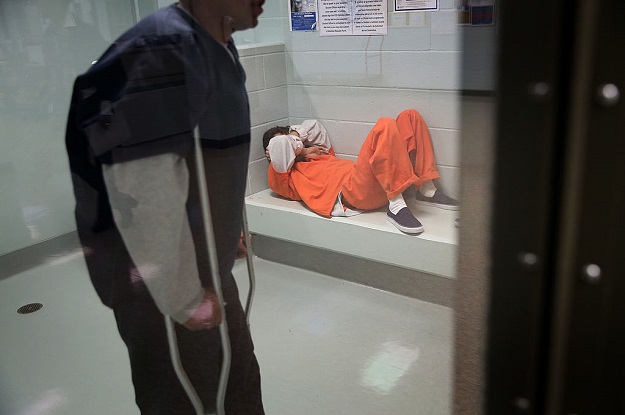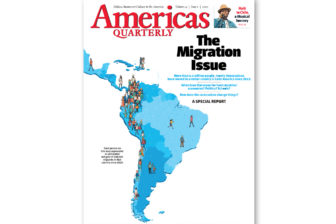Osmar Epifanio González Gadba, 32, hanged himself in March after three months in a U.S. Immigration and Customs Enforcement (ICE) detention center in California while awaiting deportation to Nicaragua.
Jean Carlos Jiménez-Joseph, 27, from Panama, hanged himself in ICE custody two months later, after 19 days in solitary confinement. The morning of his death, a volunteer for a detainee visitation program was denied access to see him. He had a history of mental illness and suicide attempts, and had told his sister that prison staff didn’t believe him.
And on June 10, Rolando Meza Espinoza, a 35-year-old father of three from Honduras, died of internal bleeding after nearly two and a half months in ICE custody. His lawyer said Meza was not receiving adequate medical care.
González, Jiménez-Joseph and Meza are three of the seven people who have died in ICE detention this year. If this rate continues, it would make 2017 the deadliest year for ICE detainees since 2008. Of the seven who have died, six hailed from Latin American and Caribbean countries. But despite this troubling trend, a series of policy changes implemented or planned by the administration of President Donald Trump are likely to increase the number of people in detention and to hold them in poorer conditions, endangering more lives, immigrant activists said.
“What was already bad is going to get worse,” said Lisa Graybill, deputy legal director at the Southern Poverty Law Center, which in March launched a large-scale initiative to enlist and train pro bono attorneys to represent detained immigrants facing deportation proceedings in the Southeast.
Trump’s policies are already increasing the number of people held in detention centers, further straining the system. Immigration arrests rose 38 percent in the first three months of 2017 when compared to the same period in 2016. Further, the average daily number of individuals in ICE detention stands at 38,613 – a 12.3 percent increase over last year, and the highest number since 2001, when the government began recording this data. ICE officials did not respond to calls for comment, though they did respond to AQ’s requests for statistical information
That these numbers are on the rise is not surprising given the priority the administration has placed on detention. Trump signed an executive order in January that broadened the category of unauthorized immigrants targeted for detention, and another calling for the detention of individuals apprehended by the Department of Homeland Security for violating immigration law, terminating the “catch and release” policy of providing alternatives to detention while an individual’s case is pending.
In order to hold this greater number of detainees, the executive orders called for the construction of detention centers near the border. In his proposed budget for the 2018 fiscal year, Trump requested $1.5 billion “for expanded detention, transportation and removal of illegal immigrants.”
As it pushes for more detentions, the Trump administration also reportedly has plans to weaken protections for immigrant detainees. These include not requiring jails that hold them to provide translation services, or setting a minimum standard for policies regarding solitary confinement, suicide prevention, or the provision of medical care. The Trump administration also plans to close ICE’s Office of Detention Policy and Planning, which regulates detainee treatment.
The administration has signaled its commitment to private prison companies, which also operate immigrant detention centers. This alarms detainee advocates, since five out of the seven detainees who died this year were being held by privately operated providers, and multiple investigations have found privately operated prisons to be more dangerous for inmates.
The Trump administration’s first gesture of goodwill toward the private prison industry came when Attorney General Jeff Sessions reversed on February 23 an Obama administration decision to stop housing federal inmates in private prisons. In April, the GEO Group – which operates facilities where four of this year’s seven deceased detainees were being held – was awarded a $110 million contract to construct a new immigrant detention center north of Houston. In May, the company renewed two ten-year federal contracts to operate prisons in Big Spring, Texas, which house unauthorized immigrants with criminal records. The contracts are expected to generate approximately $664 million in revenue.
The cozy relationship between Trump and the private prison industry began before he was elected. The GEO Group gave $225,000 to a pro-Trump political action committee in the three months before the election, as well as a $250,000 gift to Trump’s inauguration. Lobbying groups linked to GEO Group and CivicCorp – the country’s two largest private prison operators – also gave $133,246 to Hillary Clinton’s Ready for Hillary PAC, though Clinton spoke against private prisons during her campaign and vowed to end their use if elected.
The Trump administration’s close relationship and growing reliance on private prison operators like CivicCore and GEO Group, whose stocks soared after the election, pose a threat to inmates’ well-being and human rights, Graybill said. These companies operate detention centers very much like they operate prisons – with a primary concern for the bottom line.
“There’s a profit incentive to provide minimal or below minimal standards of care,” Graybill told AQ. “It’s an enormously profitable business.”
GEO Group declined AQ’s requests to speak about measures it was taking to ensure detainee care. CivicCore did not reply to a request for an interview.
Meanwhile, friends and family members of deceased detainees continue to seek answers about the circumstances of their deaths. A group of local faith leaders joined activists and friends of Rolando Meza, the father of three who died in June, in a protest outside the New Jersey prison where Meza had been held just before he died. Participants called for more information regarding his care in custody.
Basic questions remain answered. For example, ICE has reported Meza’s death as being that of a 44-year-old Salvadoran man named Carlos Mejía Bonilla, the name Meza’s lawyer said was on his ID when he crossed the border nearly two decades ago. Participants asked what else ICE could have gotten wrong in Meza’s last days.
“What care was denied?” Rev. Eugene P. Squeo asked into a loudspeaker. “Why does ICE not treat people with dignity?”
—
O’Boyle is an editor at AQ.








